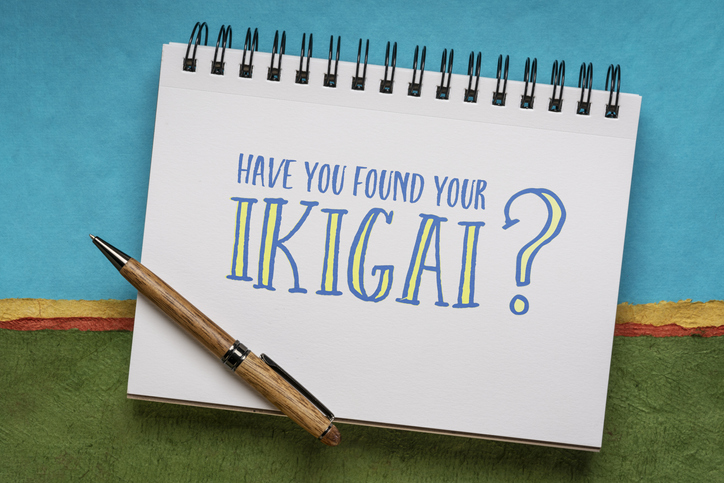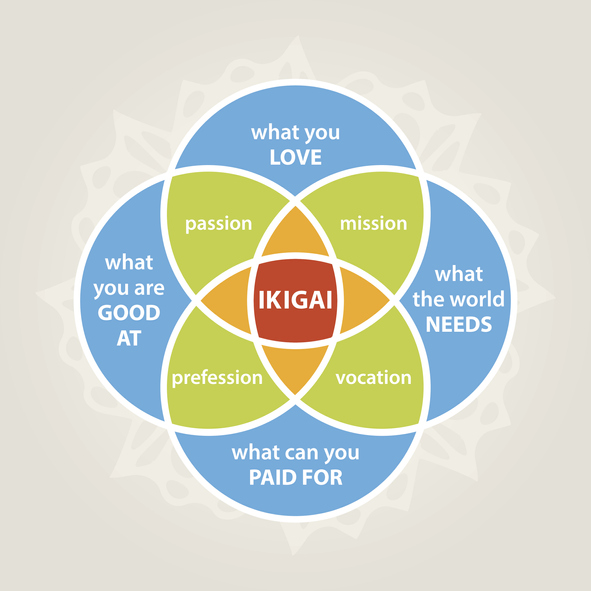
Ikigai, a Japanese concept that loosely translates to one’s “reason for living” (Garcia, 2021), is something that many people spend their whole lives searching for. To find Ikigai is to discover and live truthfully to one’s purpose and passion, finding meaning and satisfaction in both their career and personal life (People at Heart, 2020). Finding Ikigai is a journey for everyone, and if you are pursuing a life coach career, you may consider including some elements of ikigai into your practice to help your clients find a sense of happiness and purpose.
As a life coach, you will be helping your clients to build the skills to overcome obstacles, develop confidence and self-esteem, and identify a fulfilling path forward. With training at Rhodes Wellness College, you will be prepared to make a career out of coaching clients to achieve success in their personal and professional lives. Integrating Ikigai into your practice may enhance the effectiveness of your approach, helping your clients to find meaning in their lives.
Below, discover more about Ikigai and how to incorporate it into your work as a certified life coach.
The Core Elements of Ikigai
Ikigai consists of four core components, the union of all of which leads to ikigai (Hughes, 2021). These elements include what you love, what you are good at, what you can earn money for and what is needed in the world (Hughes, 2021). Finding the answers to these questions helps people to find their passion (what you love combined with what you are good at), mission (what you love and what the world needs), vocation (what the world needs and what you can be paid for) and profession (what you can be paid for and what you are good at) (Myers, 2018). At the center of all of these areas is your ikigai – your reason for existing (Hughes, 2021). This framework can be used to balance one’s true interests with the more practical aspects of life, such as earning money (Myers, 2018).
After completing your life coach training, you can apply this framework to the work that you do with clients, helping them to find a balance between what they care about and what will bring them success and stability.

Tips for Finding Ikigai
Finding one’s Ikigai is a journey that could take a lifetime, but with commitment, individuals can find what’s important to them and learn a lot about themselves in the process (People at Heart, 2020). To begin finding ikigai, individuals should engage in some self-reflection, diving deeper to identify activities they like doing, values and causes that matter to them, and their strengths and skills which can enable them to apply these interests and values to a position where they can earn money (People at Heart, 2020). In order to find the answers to these different areas of importance, individuals can start with a brainstorming session, dividing their answers into columns reflective of the ikigai Venn diagram (Collard, 2019). Through these exercises, individuals can start to identify different avenues of expression for their passion, leading to fulfillment (Myers, 2018).

Using Your Life Coach Certification to Help Clients Discover Their Ikigai
After getting your life coach certification, you’ll be qualified to help your clients find their ikigai, using your strong problem-solving skills, emotional intelligence and learned coaching techniques to help them achieve clarity and motivation. In the process of helping clients find their ikigai, providing them with some ways to engage in career exploration can be helpful in getting them started.
Try encouraging your clients to volunteer and contribute to a cause that’s meaningful to them (Garcia, 2021). This exercise can help them to start thinking about vocational prospects that they might actually enjoy (Garcia, 2021). Additionally, help your clients to become more present in the current moment (Hughes, 2021). Grounding exercises such as breathing, yoga, mindfulness and more can help clients to appreciate the little things in life and find more joy in their existence. When they are able to find pleasure and a reason for living that gets them up each morning, that is when you know that you have done your job as a life coach.
Are you ready to enroll in life coach courses?
Help your clients find their calling with a program at Rhodes Wellness College!
Works Cited:
Collard, G. (2019). Use this simple tool to reveal your ‘Ikigai’ and start a new fulfilling career. The Coach Space. Retrieved April 8, 2022, from https://thecoachspace.com/blog/ikigai-coaching-tool/
Garcia, H. (2021). How to help clients find their ikigai. Career Professionals of Canada. Retrieved April 8, 2022, from https://careerprocanada.ca/how-to-help-clients-find-their-ikigai/#fl-main-content
Hughes, M. (2021). What’s Your Ikigai? Finding Meaning in Work and Life. Mind Tools. Retrieved April 8, 2022, from https://www.mindtools.com/blog/whats-your-ikigai/
Myers, C. (2018). How to find your ikigai and transform your outlook on life and business. Forbes. Retrieved April 8, 2022, from https://www.forbes.com/sites/chrismyers/2018/02/23/how-to-find-your-ikigai-and-transform-your-outlook-on-life-and-business/?sh=21ca3b6c2ed4
People at Heart. (2020). Find your ikigai: a questionnaire to clarify your life purpose. People at Heart Coaching. Retrieved April 8, 2022, from https://www.peopleatheartcoaching.com/finding-your-ikigai









